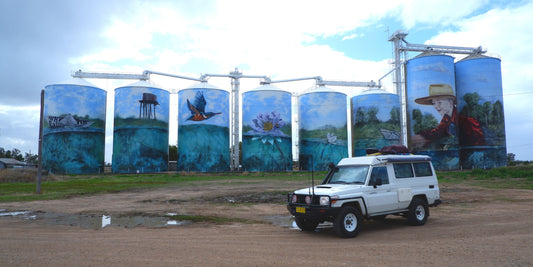Australia is the perfect country to chase a never-ending summer and experience a road trip of a lifetime. There are so many ways to travel around Australia, depending on who you are, who you're with, where you want to go, what budget you have, how long for and how comfortable you want to be.
Today we'll dive into the most asked question... how much does it cost.
Fuel
The cost of fuel can differ across Australia's regions. Urban areas might see prices around $2.10 per liter, while more remote locations, like the Desert, could reach up to $2.50 per liter. Understanding your vehicle's mileage is crucial; our troop carrier, for instance, covers approximately 450km with one of its 70L tanks, requiring around $150 to fill. Your petrol consumption will vary based on your travel pace. Having spare fuel containers can be helpful for cheaper refills.
Food
Most travellers find their grocery expenses to be similar to their home costs. If you want to manage your budget, having a freezer in your setup helps you take advantage of sales. A weekly budget of $250 for both of us suffices.
Eating Out
Setting aside funds for dining out is worthwhile. Having a budget for coffee, treats, and meals without worry is all part of the journey. We've set aside approximately $100 per person weekly for such occasions.
Booze
Alcohol expenses can add up. Prices vary across Australia, especially in rural areas. Our alcohol costs change depending on who we're travelling with, where we are and what we're in the mood for but setting aside around $60 a week is good.
Camping
Opting for free camping helps cut costs significantly. Caravan parks charge around $22+ a night for unpowered sites. National Parks usually impose fees ranging from $6 to $11 per night per person. Longer stays can accumulate costs, so assessing affordability in different regions is wise.
Vehicle Maintenance
Breakdowns, cracked windshields, shredded tires, and then some can all happen. Continually check your tires, engine and car, especially if you venture off-road frequently. Regular services should also factor into your budget. Check your insurance policy and set aside your excess into a savings fund with approximately $3,000+ for 6 months. That way, if anything pops up, you know you're covered.
Activities
Taking on the we're only here once attitude, consider setting aside a budget for out-of-the-box activities and tourist attractions. Helicopter rides, boat cruises, diving with sharks, snorkeling with seals and other cool activities deserve their own dedicated fund. This will allow you to enjoy special activities without impacting your routine expenses. How much you'll need depends on your thrill-seeker attitude. Helicopters over the Kimberley can be costly compared to snorkeling with seals in South Australia.
Unplanned Stuff
Be prepared for unexpected purchases like surfboard repairs, snorkel gear, clothing, or personal treats. These items can add up over time, so setting aside a small amount weekly helps manage such expenses.
Bills
Before embarking on your journey, settle any outstanding bills and make a note of any regular monthly bills you'll still have to pay while on the road. Things like phone plans, health insurance, app subscriptions, car registration, and mortgage payments. Break down these costs and allocate a weekly portion to stay on track, or set aside separate funds that you know will cover the expenses for the time you're away.
Travelling around Australia is one of the best things you'll do, whether driving solo or with the family in toe. The key to enjoying your trip is to be across your finances so you're not stressing about costs while away.




